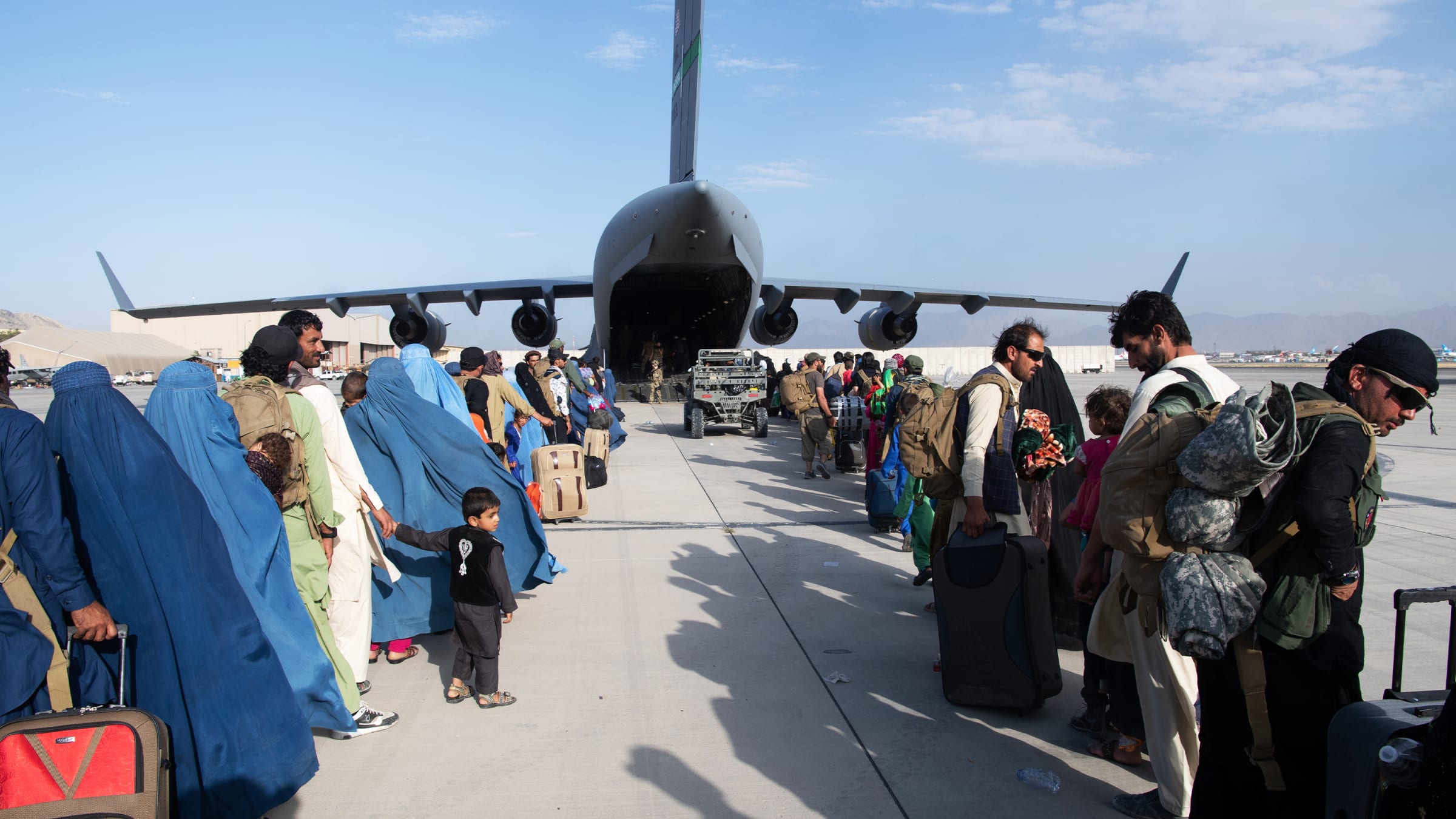We’re Giving Up On Afghanistan—and the Americans Still There

Master Sgt. Donald R. Allen/U.S. Air Forces Europe-Africa via Getty Images
The human tragedy is incalculably vast, and the political ramifications of abandoning American citizens to the Taliban could also be hugely significant.
Nemo resideo is a Latin phrase that means, “Leave no one behind.” It is such a fundamental American value that this commitment is embedded in the creed of several branches of the U.S. military. Yet some American citizens are being left behind now that the last plane has left Kabul on Monday. “We believe there are still a small number of Americans—under 200 and likely closer to 100–who remain in Afghanistan, and want to leave,” Secretary of State Anthony Blinken said on Monday. This contradicts Joe Biden’s previous comments. During an August 18 interview with George Stephanopoulos, Biden said, "If there's American citizens left, we're gonna stay to get them all out."
The decision to break that promise is wildly unpopular. According to a new ABC/Ipsos poll, 84% of Americans “think U.S. troops should remain in the country until all Americans are evacuated,” and 71% “think they should stay until all Afghans who helped the United States are evacuated as well.” These numbers exist in a world where abandoned Americans have not yet been taken hostage (except for the one that the Taliban already had) and where videos have not yet surfaced of Afghan interpreters being rounded up and summarily executed. The former is a legitimate fear; the latter is a guarantee.
And thanks to the Biden administration, it won’t be terribly hard to accomplish, either. According to Politico, “U.S. officials in Kabul gave the Taliban a list of names of American citizens, green card holders and Afghan allies…” One can only imagine what public opinion polls will look like when the Taliban targets the individuals on that list.
Keep in mind, the entire Iranian hostage crisis was based on 52 Americans being held captive. The “Canadian Caper” that the film Argo was based on involved a harrowing and elaborate operation to rescue just six Americans. In the past, we have expended tremendous effort to rescue relatively small numbers of kidnapped Americans; knowingly leaving behind hundreds of Americans in Afghanistan seems wildly inconsistent with our values and has the potential to spawn an enduring public outcry.
In a way, we have been here before. While listening to conservative writer John Podhoretz on the Commentary podcast the other day, I was reminded how much of my childhood was overshadowed by talk of Vietnam War POWs allegedly being held captive after the war’s end in 1973.
Now, there is a difference between allegedly abandoning military members and abandoning U.S. civilians, though I’m not sure which is worse. The point, though, is this was a major part of the 1980s cultural zeitgeist, as movies like The Deer Hunter and Apocalypse Now were replaced by hits like Chuck Norris’s Missing in Action (“One man who wouldn't forget the Americans who were left behind” and “The war isn’t over until the last man comes home”), Gene Hackman’s Uncommon Valor (“C’mon, buddy, we’re going home”), and Sylvester Stallone’s Rambo: First Blood Part II (“Sir, do we get to win this time?” and “You know there’s more men out there. Find them, or I’ll find you!”)
Those movies (all box offices hits) provided a venue for acting out our fantasies of rescuing Americans and exorcising a humiliating defeat at a time when there were numerous reported sightings and photos of long-lost prisoners of war and when you couldn’t go anywhere without seeing one of those black POW/MIA flags. In 1987, Ross Perot concluded a nine-month investigation of the issue, writing to President Ronald Reagan: “We left POWs behind at the end of the war in Vietnam.”
I’m not trying to relitigate Hollywood’s (and Perot’s) assertion, but to instead explain how widely and passionately believed this was for decades—and what that says about the feelings that linger when a war ends in humiliating defeat. As recently as 1991, “69 percent of the American people believed that U.S. POWs were still being held in Indochina, and 52 percent had concluded that the government was derelict in not securing their release,” according to a Wall Street Journal/NBC News poll. Now, imagine the potential for a new variant on this same kind of populist angst—real or imagined—to take root regarding Americans in Afghanistan.
That could happen with just a few Americans left behind. But here’s where the plot really thickens. A couple of weeks ago, the Biden administration was saying there were 10,000 to 15,000 U.S. citizens in Afghanistan. As recently as last week, The Washington Post was citing that number. Then, all of a sudden, the Biden administration began saying that there were just 6,000 U.S. citizens (“who wanted to leave”) as of August 14. After accounting for the current evacuations, that meant there would be just a few hundred Americans left in Afghanistan.
Not everyone is buying it, though. Michael Pregent, a senior fellow at the Hudson Institute (a conservative think tank based in Washington, D.C.) and a former intelligence officer, disputes the administration’s numbers. “Thousands of Americans remain in Afghanistan that want to leave,” he tweeted. “This ‘hundreds left’ is political math. We shouldn't leave 1 behind, but lying about the numbers abandons hope for thousands of Americans trying to get out.” I asked Pregent what he meant by political math, and he told me that anyone left behind will be put in the “chose to stay” category.
If he’s right, this would be a huge scandal. A simpler and less sinister explanation is that this boils down to gross incompetence on the part of the Biden administration. There is a huge gap between 15,000 and 6,000. But even if we assume that the administration is now shooting straight with us, their estimation was so far off that their competence should be questioned, as well as the veracity of their new data. Regardless, the administration has invited suspicion with their initial estimate.
There is little chance of a Vietnam POW-type situation where Americans just disappear or are perpetually “unaccounted for,” but a real chance that Americans will be taken hostage or worse for ransom or propaganda purposes.
And indeed hundreds of Americans have been left behind, despite the Biden administration’s protestations to the contrary, and that number surpasses the number of American diplomats held during the Iran hostage crisis. How will this age? Most Americans, I’m sad to say, might finally accept abandoning our allies to the Taliban. But not leaving Americans behind.
If there is one remaining bit of hope we can cling to, it’s this: The United States and other countries have supposedly brokered a deal whereby the Taliban will allow “safe passage” for people who want to leave Afghanistan in the future. Color me skeptical they will live up to this agreement, but Biden better hope they are motivated by money enough to keep their promise. Abandoning Americans is not something that will be forgotten in a news cycle or two. And then, another Latin phrase will apply: Sic transit gloria. Glory fades.
